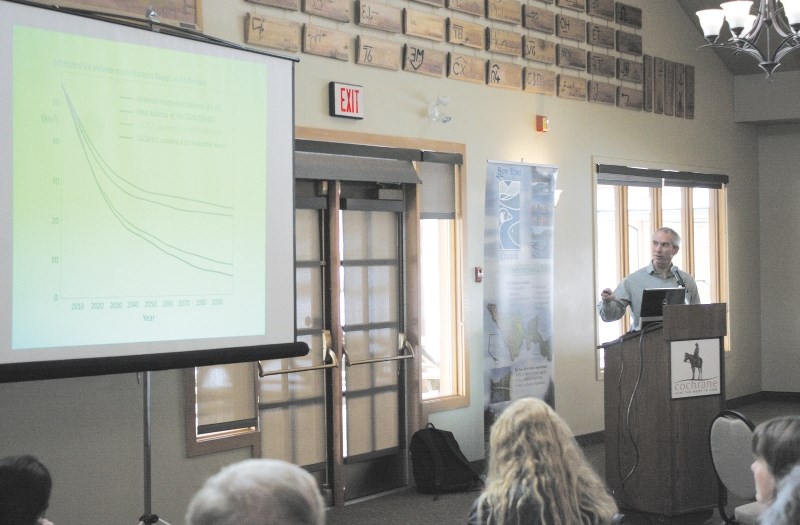The Bow River Basin Council (BRBC) held a presentation at the RancheHouse on the importance of water management in the basin, highlighting key areas, such as climate change and drought, which have adverse affects on the Bow River’s water supply.
Keynote speaker Shawn Marshal from the University of Calgary said the purpose of the meeting was to get all stakeholders together to plan and work as a cohesive unit to enable the best possible preparation for the future and the perils it may hold.
“People should understand others’ needs and work together,” said Marshal, pointing out that at some point in the future the Southern Alberta area will experience a drought that will test the preparation currently underway.
Marshal said that although some stakeholders can display somewhat of a defensive posture when issues like water conservation and the possible divvying up of water licences are suggested, he cautioned that even though at the present time there is enough water to go around, this may not always be the case, particularly when, not if, a drought hits.
He said the most important thing we can do at this time is to map out a strategy to prepare for such an occurrence.
Marshal pointed out that droughts are naturally occurring weather patterns and not attributed to what he referred to as human-caused climate change; droughts typically last anywhere from five to 10 years.
“We’re working toward a better future and ways to improve what we have now,” said Edith Vanderpuyem from Alberta Environment. “It’s clear that there are still unanswered questions.”
Also speaking during the Nov. 23 event was Mike Nemeth from Alberta WaterSMART, who spoke about the South Saskatchewan River Basin Adaptation Project and how climate change models are used to determine future flow patterns and how that impacts water management.
“Most of the time you don’t have to manage streamflow in the Bow,” said Nemeth, “but then you get a year like 2001 (a very dry year) and everything changes.”
Both Nemeth and Marshal admitted that data from climate change is not an exact science, but the important thing was that they were planning for potential impacts based on what information they do have, providing support for future management initiatives.
Speaking to climate change, Marshal indicated that the information they have gathered leads them to believe that Southern Alberta can expect wetter winters and dryer summers in the coming years.
“Imagine Southern Montana coming into Southern Alberta,” Marshal compared.
Nemeth explained that the difference between climate and weather was that weather is what happens at any given time, while climate looks at the last 30 years to determine future patterns.
Climate change is what has been seen as an increase in the mean and variant temperatures over that 30-year period.
Visit brbc.ab.ca for more information.




